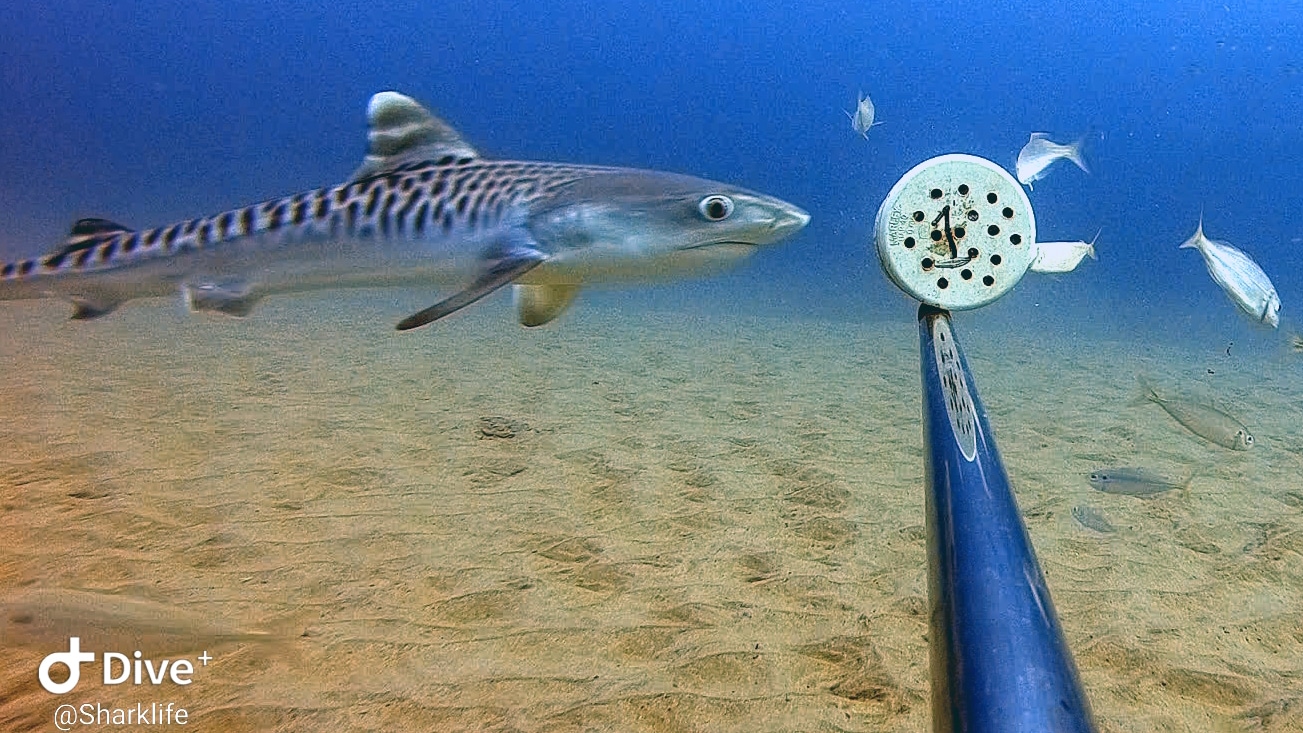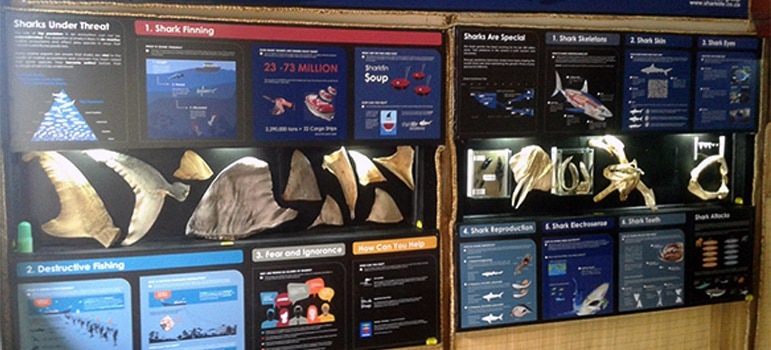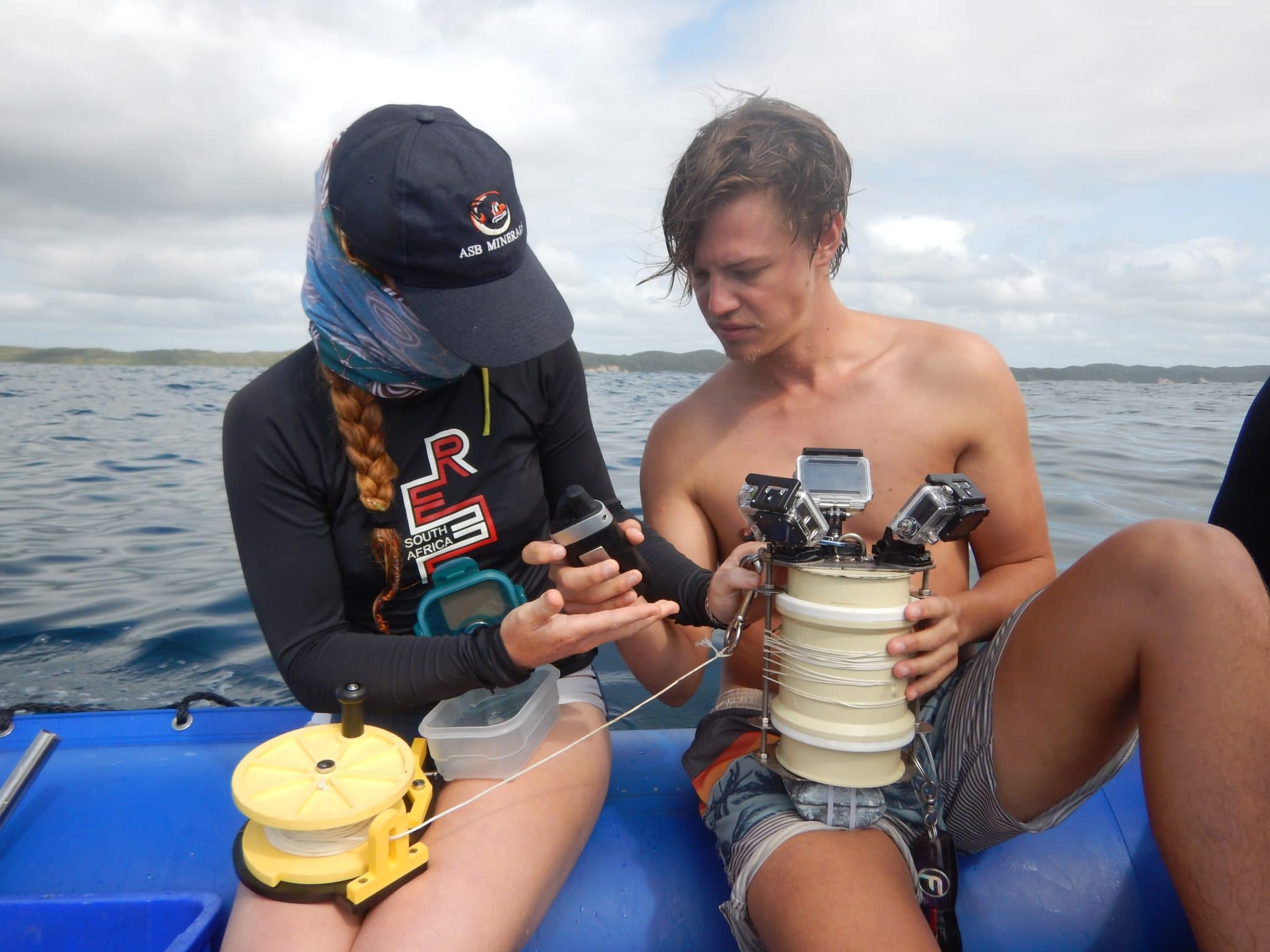Marine Life & Conservation Blogs
All about Sharklife

There is nothing quite like seeing an apex predator in the wild and divers are very fortunate to have the privilege to get up close and personal with one of the world’s most striking predators. South Africa is home to a great number of shark species that attract thousands of tourists every year. Great Whites, Tigers and Bull sharks are just some examples of over 100 different shark species living in the oceans around the South African coastline.
With such an array of species, it’s no wonder there are so many research and conservation organizations in the country that do exceptional work. These entities are collecting important data that is showing how important the shark species is, not only the ocean’s survival, but that of mankind too.
So, what’s the big deal, they’re just fish with teeth?
Sharks have an undeserved reputation as being man-eaters. Considering the millions of people that use the ocean everyday whether for recreational or occupational use, as few as 10 people die from shark interactions annually. If they were the man-eaters we made them out to be, that number would be much higher. More people die from accidents with household appliances in one year than people have died from sharks in the last 100 years.
The shark is an important part of the ocean’s ecosystem, but more importantly it’s their role in the survival of the planet we need to be concerned about. With an estimated 100 million sharks being killed every year, ocean ecosystems around the world have been severely destabilized and unbalanced. Sharks help maintain a healthy gene pool by predating on the weakest of their prey, ensuring the strongest survive to continue the species.
If we wiped out the Great White Shark population in South Africa, there would be an abundance of seals, this growing population of seals, now the new apex predator in the area, would very soon consume to a point of extinction many crustaceans and small bait fish resulting a complete collapse of many fishing industries and worse, the collapse of an entire ecosystem.
Education about the importance of sharks and changing people’s perception of sharks are small actions that can make positive change. An organization that has been working hard to educate people about sharks is “Sharklife”.
I recall becoming a Sharklife Instructor in 2008 when the organization had just started offering a range of courses on several of the shark species found in South Africa. Courses were offered on specific sharks and required a number of dives to study the shark’s behavior and unique characteristics. One of the challenges we faced as instructors was guaranteeing shark sittings on training dives. Some sharks are much easier to encounter reliably than others.
We had some interesting dives experimenting with different non-invasive methods of attracting sharks for our students to study. The most noteworthy of these experiments was trying find what would attract Bull Sharks. These elusive predators can be very inquisitive and engaging which made for some exciting learning experiences.
Today Sharklife has a permanent base in Sodwana Bay, South Africa. At the current premises, Grant Smith, Sharklife managing director, oversees a number of research projects and conducts research internships for candidates from all over the world. In addition to the various shark courses on offer, there is a shark museum with some fascinating displays and shop where you can purchase a host of different shark related products.
Sharklife Objective:
Through scientific research, education and awareness bring about positive change to the current destructive trends of ocean exploitation.
Sharklife Current Aims:
- To develop a compassionate desire to conserve sharks by altering public misconceptions about sharks and replacing the “Jaws” syndrome with positive understanding and respect.
- Reduce anthropogenic threats to over exploited marine species by increasing awareness and encouraging sustainable seafood choices.
- Increase marine tourism and transform shark populations into a sustainable living resource by developing educational ocean experiences for all South African’s
In line with aim number 2, one of their achievements was the removal of shark nets in the Rocky Bay area in Kwa-Zulu Natal. An initiative that started in 2008 and took years of relentless campaigning resulted in the removal of the shark nets in this Marine Protected Area. The capture of 14 Tiger Sharks on the 18th April 2012 was a catalyst that renewed efforts for the lifting of the nets and on the 30th April 2014 the nets were lifted for the last time.
More information about this campaign can be found here: https://www.sharklife.co.za/index.php/our-projects/completed-projects/shark-net-removal
How can you get involved?
Visit their website, www.sharklife.co.za and sign up for free shark course. You can even adopt a shark and join as a monthly member.
Regardless of the organization you support, something has to be done before it really is too late to turn back and recover. There are hundreds if not thousands of initiatives out there to get involved with or contribute to and I know all of them appreciate the smallest donation of time or money.
Personally, I would hate to never again see the wonder in a diver’s eyes when they interact with a shark for the first time.
Article by PJ Prinsloo – www.pjptech.co.za
Blogs
Saba’s Plan for a Coral Comeback

Saba has an exciting new initiative to restore its coral reefs. This new project, running from 2024 to 2026, will focus on reviving key species in the island’s underwater ecosystems. With a collaborative team from the Saba Conservation Foundation (SCF) and Van Hall Larenstein (VHL) University of Applied Sciences, the project aims to restore both corals as well as sea urchins.
This initiative is centered around coral restoration, specifically reviving two essential coral species—staghorn coral (Acropora cervicornis) and elkhorn coral (Acropora palmata). By mapping parent colonies and using a technique known as coral gardening, SCF will create and maintain coral nurseries. These corals will eventually be outplanted at key reef sites around Saba to not only expand the number of coral colonies, but also provide essential fish habitat. The project focusses on installing coral nurseries, training staff with the newest techniques and starting with the restoration of key reef sites.

Reef Cleaners to the Rescue
It’s not just corals getting a makeover—this project also shines a spotlight on the essential role of grazers, particularly sea urchins. VHL is leading the charge on cultivating and restocking two key sea urchin species, West Indian sea egg (Tripneustes) and long-spined sea urchin (Diadema), known for their ability to keep algae in check. By removing algae, which are important competitors of corals, they help the coral to thrive. By restoring these “reef cleaners,” Saba’s project will give corals the breathing room they need to grow, setting the stage for a healthier, more balanced marine ecosystem.
From Tiny Urchins to Big Goals
The project will be funded as part of the Dutch Government’s Nature and Environment Policy Plan (NEPP) 2020-2030 for the Caribbean Netherlands, a comprehensive initiative aimed at conserving and restoring the unique natural environments of the Dutch Caribbean islands, including Saba, St. Eustatius, and Bonaire. This project is aiming for big milestones: build and maintaining coral nurseries, the expansion of urchin cultivation facilities, and the creation of a dedicated research center. By 2026, the project hopes to ramp up coral and grazer restoration, with the ultimate goal of extending these efforts across the Dutch Caribbean. By linking local initiatives to broader regional goals, Saba’s restoration project promises to leave a lasting impact on both the environment and the community.
Find out more about the DCNA at dcnanature.org.
Blogs
Reef-World marks two decades of marine conservation: strengthening impact amid coral reef threats

Empowering ocean stakeholders to tackle future challenges and ensure the survival of coral reefs and humanity
2024 marks the 20th Anniversary of The Reef-World Foundation’s tireless efforts for global coral reef conservation. The UK charity is the international coordinator of the UN Environment Programme’s Green Fins initiative, known as the leading voice in sustainable marine tourism. Today, Reef-World released its 2023-2024 Impact Report outlining a year of substantive growth and impact in its marine conservation programmes.

Impact Report Highlights:
- Impressive improvements in environmental behaviours to protect coral reefs by the marine tourism industry as the global participation of Green Fins increases.
- Continued capacity building for government and NGO staff to effectively manage marine tourism activities in Asia, Caribbean and Red Sea regions.
- For the first time in Green Fins’ 20-year history, tourism operators have achieved ‘Best Environmental Performer’ status by demonstrating the lowest possible environmental impact in their environmental assessments. In 2024, three dive operators achieved this challenging milestone.
- Significant increases in global participation of Reef-World’s innovative digital conservation tools.
- 138 Green Fins dive operator members achieved the strict threshold for PADI Eco Center recognition.
- Developed four new educational materials and translated two into 16 languages to support the marine tourism industry in achieving sustainability targets.
- Establishing a new Reef-World Development strategy and recruiting new roles – Development and Programmes Managers.
- Reef-World’s board welcomes new Chair and Trustees strengthening organisational leadership.

Reef-World started as a one-person mission to inspire and empower communities to act in conserving and sustainably developing coral reefs and related ecosystems. Today, the team of 12 continues to meet this mission by inspiring and empowering the global marine tourism community to be exemplary sustainability leaders by using the Green Fins guidelines and tools to simultaneously use and protect the world’s precious reefs.
In April 2024, the fourth global coral reef bleaching event was confirmed. Reef-World’s work has never been more urgent as the marine environment, and the benefits they provide humanity, continue to be eroded by global threats. The reduction of local threats, like those from the marine tourism industry, is an essential step to ensuring a future where coral reefs survive and continue to support the millions of people who depend on their ecosystem benefits. Reef-World’s work buys time for coral reefs and related ecosystems to be resilient to the impacts of global threats.
“Right now our corals are facing the greatest fight of their existence as the terrifying predictions of the steps towards their complete extinction are starting to come true. But all is not lost, reefs are resilient and they have existed on this planet for millions of years. We must take action now, to buy time for reefs by reducing threats facing them and allowing them to react and adjust to the changing environment they need to survive in.” – Chloe Harvey, Executive Director
Looking Forwards:
Like coral reefs, the Reef-World team needs to be resilient in the face of the complex challenges of the conservation sector. Reef-World has invested significantly in developing a Culture of Care to ensure the well-being of its team on a daily basis, continuing to be an exemplary employer to enable its team to best achieve the mission for coral reef conservation.
With the foundations of a Culture of Care and organisational development laid, Reef-World is emerging from the end of a natural organisation life cycle, that brings the challenges of growth and scale, stronger than ever. With a new strategy in place to generate much needed resources, Reef-World is excited for the opportunities to leap forward, continue to scale our impact and lean into new innovations and untapped opportunities for marine conservation.
We continually strive to become a forward-thinking organisation that delivers on our goals and commitments to our stakeholders with fresh approaches and not being afraid of steering away from a “normal approach.” This approach is not only applied to our programmes of work but also internally and carries over to our Culture of Care for our team.” — JJ Harvey, Operations Director

The Reef-World Foundation is immensely grateful for the continued support of its grant funders: UN Environment Programme, IUCN’s Blue Natural Capital Financing Facility, Adventure Travel Conservation Fund, PADI Aware Foundation, and World Nomads Footprints Program.
Reef-World would also like to express its gratitude to international partners whose vital support has resulted in significant tangible benefits for our work and mission: PADI; Professional SCUBA Schools International (PSS); Explorer Ventures; 1% for the Planet; ZuBlu; Snorkel Venture, GSTC; Dive O’Clock; Seven Dragons; DiveAssure and Eco Beach, without whom these achievements would not be possible.
The full 2023–2024 Annual Impact Report is available on Reef-World’s website.
-

 News2 months ago
News2 months agoIconic SS United States to become the World’s Largest Artificial Reef
-

 News3 months ago
News3 months agoBook Review – 52 Assignments: Underwater Photography
-

 Gear News3 months ago
Gear News3 months agoDYNAMICNORD – New German diving brand enters the British market
-

 News3 months ago
News3 months agoExploring Cenote El Pit: A Diver’s Dream
-

 Gear News3 months ago
Gear News3 months agoTry BARE drysuits (and maybe even win one!) this Friday with Sea & Sea at North West Dive Fest
-

 Marine Life & Conservation3 months ago
Marine Life & Conservation3 months agoBook Review: Coral Triangle Cameos
-

 Blogs2 months ago
Blogs2 months agoDive the Egyptian Red Sea this Autumn with Regaldive
-

 News3 months ago
News3 months ago2024 Ocean Art Underwater Photo Competition Announced

















